Published 1st March 2021
Social media applications like Instagram and TikTok have become a ubiquitous part of our lives.Even migrant workers and domestic helpers have hopped on the bandwagon and created social media accounts of their own. Whether it is for entertainment, to talk about politics, or as a means of sharing art, this medium has given migrants an avenue to express themselves.
The TikTok Star
@sayed9873 ##comillar_king ##youngstarsbd_sg ##duet @porimoni681 @____misty_queen____ @davidreya @maya_horini
♬ original sound - Isha Jahan
Mr Sayed Muhammed Abu, 26, is anything but camera shy. A TikTok star in his own right, his love for acting and music manifests in the short videos he curates and uploads daily.
With 3,765 followers and over 50,000 likes, what started out as a hobby for Mr Sayed has steadily grown into a passion of his.
Before coming to Singapore, Mr Sayed used to be a model in Bangladesh. While dreaming of pursuing a modeling career again in the future, Mr Sayed is now taking the time to hone his modeling skills on TikTok.
“Making TikTok videos helps me practice modeling in some ways and it’s a very fun pastime. All my friends and colleagues know that I love it and support me as a creator,” said Mr Sayed.
The content that Mr Sayed creates are usually light-hearted and funny, usually of him dancing to songs he enjoys or reacting to videos he comes across. He also re-enacts short scenes from famous movies or trends. Some of his videos have garnered over 5,000 views. The video clips might only be a minute long but the editing process is tedious, especially since Mr Sayed uploads content daily.
When asked how he manages to upload consistently despite holding a full-time job, he said he makes time every Sunday night to film all the videos for the week.
“When I get to my dormitory after work, I film at least 10 videos in one night. I would edit them once I’m done and schedule them for the week,” he said. “I don’t try to do what is on-trend just to be famous. I just do what I love and what makes me happy.”
The Artist
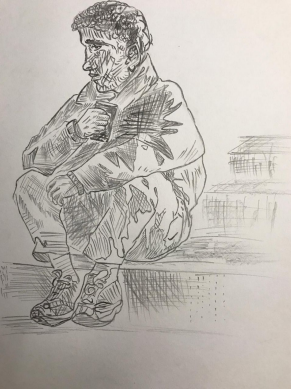
Photo courtesy of Pardeep Kumar
Ever since he was a child growing up in India, Mr Pardeep Kumar, 36, always loved to draw. “Back then, I only knew how to draw flowers and trees,” said Mr Kumar, who has worked in Singapore for five years. Now, he sketches mostly people. “Drawing became my passion.”
Mr Kumar cut his teeth in sketching when he started to take lessons from his art teacher in school.
Reflecting on art lessons with the teacher, he said: “ She taught me how to do shading, how to draw a man, how to draw a tree…She was always patient even when I made mistakes. I’m very thankful to her,” said Mr Kumar, who was only 10-years-old then.
But with his job as a safety coordinator taking up most of his time, Mr Kumar found few opportunities to continue his passion, and took a hiatus from sketching since 2017.
It was only during the circuit breaker in April last year that he had the chance to pick up a pencil again, and in his free time, managed to rekindle his love for sketching.
“Sketching made me feel relaxed and happy,” Mr Kumar said. Most of his sketches are inspired by his younger days. “When I draw, I reminisce about my schooling days and my life in India.” When Mr Kumar’s migrant worker friends saw his sketches, they decided to post them on the Facebook group Migrant Writers of Singapore, in hopes that more people could view them.
Sketches drawn by migrants are posted on the group every Friday, with migrant writers responding to the artworks with poems of their own. To Mr Kumar's surprise, his sketches garnered positive attention “People reacted to my sketches and left comments that my work was amazing and evoked emotion,” he said. “That made me very happy, but I’m quite shy so I did not know what to reply,” Mr Kumar said with a bashful grin.
His friends continued to post his sketches on the Facebook group, and they continue to be well-received; multiple migrant workers whom he did not know, wrote poems based on his sketches.
While Mr Kumar has used Facebook for more than a decade to communicate with his family members, he did not expect it to be a medium of sharing his artwork. “I don’t use social media a lot because I’m always working, so it was a surprise that social media ended upbringing so much attention to my art,” he said.
The Blogger
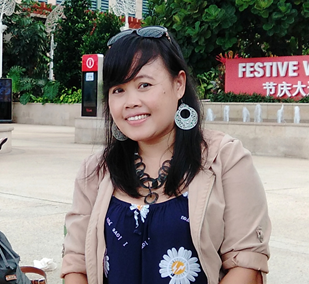
Photo courtesy of Novia Arluma
Some people own blogs to share about their daily lives, but for Ms Novia Arluma, a 43-year-old domestic helper from Indonesia, blogging carries a noble purpose.
“On my blog, I help to simplify current affairs and government policies in Bahasa Indonesia for domestic helpers to understand,” she explained.
“I realised that many of my friends don’t have a strong grasp of whatever is going on in society. Official news sources are mostly in English and difficult for them to read.” Ms Arluma said. This situation made her realise that she had to do something to help.
Through her articles, Ms Arluma hopes to create an informal platform to share information and improve communication among members of the Indonesian community. “Everyone has the right to understand,” she added.
The response to her work has been positive so far. “Readers have commented that they find my pieces useful and visit my blog often.”
But when she started her blogging journey more than a year ago, Ms Arluma intended to bring attention to workers’ welfare.
After hearing about a Burmese domestic helper who committed suicide, she posted an open letter to employers in Singapore. The injustice, sadness, and anger she felt were captured in a few short paragraphs.
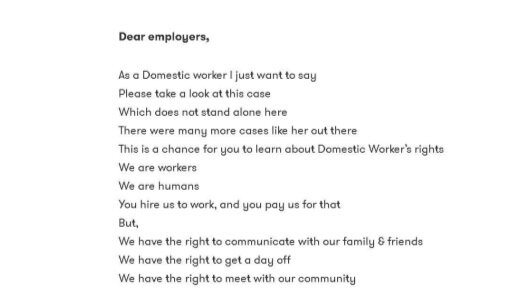
Her voice resonated with many domestic helpers in Singapore. The open letter garnered over 200 shares and was even reposted on the Humanitarian Organization for Migrant Economics (HOME) website.
Ms Arluma reflected, “When people share my work, it means that they understand the severity of problems affecting the domestic helpers community and want to learn more.” She added: “I believe that promoting my blog posts on Facebook enables people to have open discussions about these important topics.”
br>From then on, Ms Arluma continued to create more content, expanding her range of work from political articles to short stories about the lived experiences of fellow domestic helpers.
But her favourite pieces are op-eds, which allow the writer to express their personal opinions. She enjoys them because they allow her to freely explore her feelings towards issues that she cares about.
To Ms Arluma, writing is like “therapy to her mind” and she feels a sense of relief every time she manages to put her thoughts into words. She said that she will continue writing in the long run because she is passionate about domestic helpers’ rights, and will speak up for this community even after she retires.
Click here to read more of her work
Social media has given migrants in Singapore a platform for self-expression. Whether they use it as a tool to pursue their dreams or to champion issues they are passionate about, these platforms have given them a voice.
Until their voices are recognised and valued, these platforms will have to suffice, serving as a bridge to connect locals and migrant workers alike. ∎

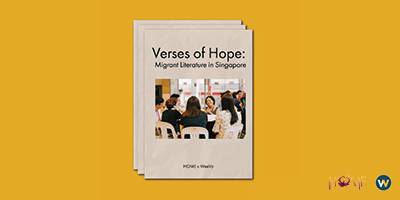
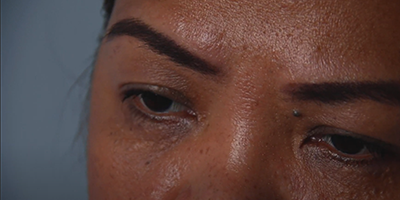
 Wee Kim Wee School
Wee Kim Wee School